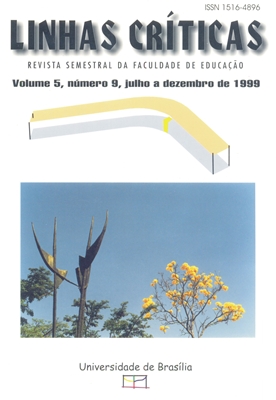A política de informática na educação brasileira: do nacionalismo ao neoliberalismo
DOI:
https://doi.org/10.26512/lc.v5i9.2750Palavras-chave:
Educação - história;, Política educacional;, Informática;, Ciência e tecnologia;, Tecnologia educacionalResumo
Este artigo, síntese de uma tese de doutoramento, compreende a análise histórica da política de informática na educação brasileira, bem como as principais experiências na rede pública de 1° e 2° graus até 1995. O estudo empreendido orientou-se metodologicamente por uma abordagem crítica e reflexiva, analisando o objeto de estudo nas inter-relações econômicas, políticas e socioculturais das quais é parte integrante. O argumento central da tese é que, se não houve até o momento uma capacitação mais democrática quanto às novas tecnologias, é porque não interessa ao Estado e ao mercado globalizado conviver com a maioria da população efetivamente instruída. O saber é, historicamente, posse de uma elite; sob o capital, a informática - e as novas tecnologias em seu conjunto - é meio de produção, instrumento de poder, guerra e ideologia, e, sob o capitalismo, um conhecimento estruturalmente desempregador, fenômeno cada vez mais crescente nas economias capitalistas dominantes e periféricas, como o Brasil. O que se avizinha no horizonte neoliberal não parece superar essa tendência. É necessário construir uma contra-hegemonia, reorientando o uso político, econômico e cultural das novas tecnologias em favor das maiorias.
Downloads
Downloads
Publicado
Como Citar
Edição
Seção
Licença
Copyright (c) 2016 Linhas Críticas

Este trabalho está licenciado sob uma licença Creative Commons Attribution 4.0 International License.

Todas as publicações da revista Linhas Críticas serão licenciadas sob uma licença Creative Commons Atribuição 4.0 Internacional (CC BY 4.0). Isso significa que qualquer pessoa tem o direito de:
Compartilhar — copiar e redistribuir o material em qualquer suporte ou formato;
Adaptar — remixar, transformar, e criar a partir do material para qualquer fim, mesmo que comercial.
As pessoas autoras não podem revogar estes direitos desde que sejam respeitados os termos da licença.
Conforme os termos:
Atribuição — as pessoas leitoras devem atribuir o devido crédito, fornecer um link para a licença, e indicar se foram feitas alterações. As pessoas leitoras podem fazê-lo de qualquer forma razoável, mas não de uma forma que sugira que o licenciante o apoia ou aprova o seu uso.
Sem restrições adicionais — as pessoas autoras não pode aplicar termos jurídicos ou medidas de caráter tecnológico que restrinjam legalmente outros de fazerem algo que a licença permita.
Autores/as que publicam nesta revista concordam com os seguintes termos:
- Pessoas autoras mantém os direitos autorais e concedem à revista o direito de primeira publicação, sendo o trabalho simultaneamente licenciado sob a licença Creative Commons Atribuição 4.0 Internacional (CC BY 4.0), o que permite o compartilhamento do trabalho com reconhecimento da autoria e publicação inicial nesta revista.
- Pessoas autoras têm autorização para assumir contratos adicionais separadamente, para distribuição não-exclusiva da versão do trabalho publicada nesta revista (ex.: publicar em repositório institucional ou como capítulo de livro), com reconhecimento de autoria e publicação inicial nesta revista.
- Pessoas autoras têm permissão e são estimulados a publicar e distribuir seu trabalho online (ex.: em repositórios institucionais, repositórios préprint ou na sua página pessoal) qualquer ponto antes do envio da versão final do artigo à revista, já que isso pode gerar alterações produtivas, bem como aumentar o impacto e a citação do trabalho publicado.



